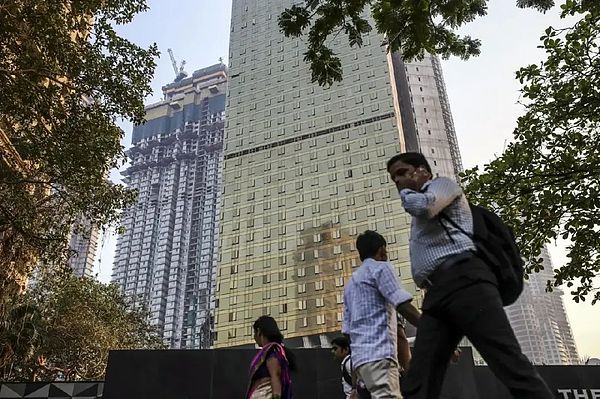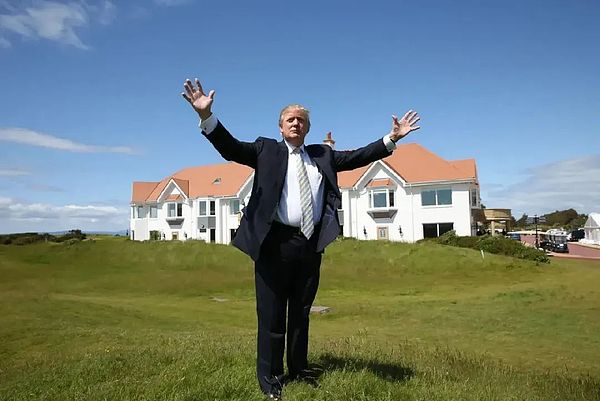Source: Forbes
Donald Trump is known to love business, having struck numerous deals around the world over the years. The Trump Organization has put the Trump name on hotels, golf courses and luxury apartment buildings in more than a dozen countries.
The latest news: About a month after Indian Prime Minister Narendra Modi visited as Trump's first international White House guest, the Trump Organization announced that it would build a commercial tower in Pune, India.
The avalanche of new U.S. tariffs triggered by Trump's trade war launched on April 2 may hit his overseas business territory. The risk does not come from the tariffs themselves - the Trump Organization does not manufacture products overseas and ship them back to the United States - but from the huge economic uncertainty and turmoil caused by its subversion of the global business order. "The impact is shifting from tariff shocks to demand destruction, which is more significant," said Michael Bellisario, a hotel industry analyst at Baird, earlier this week.
If the demand contraction persists, the global tourism industry will suffer—already suffering in the United States as a result of Trump’s tightening immigration and student visa policies. “Travel is more fungible than other types of consumption,” said Bjorn Hanson, a hotel industry consultant. If the recession is blamed on Trump’s policies, his properties—such as golf courses in Scotland and Ireland—may be particularly hard hit.
Perhaps unsurprisingly, all 13 countries where the Trump Organization does business (including two EU members) have shown at least a willingness to negotiate with the United States, meaning they will benefit from a 90-day reprieve from some tariffs. The United States actually has a trade surplus with six of them, meaning they will initially be hit by only the minimum 10% tariff. In stark contrast, Trump does not own any properties in China—a country that is in a standoff with the United States over soaring tariffs, and whose shocks have caused unrest in global markets.
Trump has largely avoided his own risk, meaning that it is his international partners, not himself, who will bear the brunt of the impact. The reason is that most "Trump properties" are actually brand licensing and management agreements - property owners pay fees in exchange for the right to name the Trump brand, and sometimes add management services.
The biggest impact may be on projects that are still in the planning or construction stage, such as developments in Vietnam and Saudi Arabia, which may be delayed due to macroeconomic uncertainty. However, Hansen pointed out that Trump's business is unlikely to collapse in the short term: "The people who hate Trump the most have long stopped licensing him. The downside risk behind this is actually quite limited."
Here is a list of all the countries where Donald Trump owns properties or has signed brand licensing agreements, and marked how they are affected by the tariffs that Trump originally announced (currently suspended for 90 days). But it should be noted that the 10% "base tariff" still exists.
01 Vietnam "Liberation Day" tariff rate: 46%
The Trump Organization reached a cooperation agreement with Vietnamese real estate giant Kinh Bac City Development in October last year. The project will reportedly invest $1.5 billion to develop golf courses, hotels and residential properties in Hung Yen province, southeast of Hanoi, but it is unclear whether it has broken ground. When Trump announced the imposition of super-high tariffs on the Southeast Asian country, Jingbei Group's stock price plummeted 25%, and only partially recovered after the announcement of the suspension of tariffs. On April 4, Trump posted on his social platform Truth Social that Vietnam had offered to completely eliminate tariffs on US goods in exchange for tariff exemptions.
02 Indonesia's "Liberation Day" tariff rate: 32%
"The largest and best quality" is how billionaire Hary Tanoesoedibjo described his Bali resort plan in an interview with Forbes in 2017. As early as two years ago, his MNC Group announced a partnership with the Trump Organization to develop Bali and Lido resort projects. Harry and Trump share the same path to wealth (real estate and media) and political ambitions, but Tano Sodib has yet to become Indonesia's leader.
A decade later, while the Trump-branded golf course at Lido has opened, surrounding properties are still under construction. There are signs that the Bali project is suspected to be aborted, which has reportedly left local construction workers in trouble. Trump's latest financial filing does not show revenue from these two projects. As for the trade war, Reuters said Indonesia has proposed increasing purchases of US energy and agricultural products in exchange for an agreement to reduce tariffs.
03 India "Liberation Day" tariff rate: 26%
The world's most populous country also has the largest number of Trump projects outside the United States. Forbes estimates that Trump will make nearly $1 million in profits from brand licensing of Mumbai and Gurgaon towers in 2023, but Trump-branded towers in Kolkata and Pune do not seem to have brought in any revenue yet. The Trump Organization's website also lists several projects as "coming soon" - including the Pune commercial property plan announced just last month. India’s government, led by Modi, a Trump ally, has not yet retaliated against U.S. tariffs — he is reportedly seeking to negotiate lower tariffs.

The golden Trump Tower in Mumbai is under construction in 2018.
04 South Korea Tariff rate on "Liberation Day": 25%
South Korea chose to negotiate a solution to the tariff issue. "Their top team has flown to the U.S. and things are looking good," Trump wrote in a tweet on his social media platform Truth Social, the same day that tariffs on South Korean imports took effect (and were quickly suspended). Although Trump is skeptical about the value of U.S. troops stationed in South Korea, he actually has a deep connection with South Korea: In the 1990s, he licensed the use of his name to six buildings built by Daewoo Group in Seoul and three other cities — the chaebol went bankrupt during the Asian financial crisis. The latest financial disclosures indicate that the deal did not generate revenue, but Google Street View shows that his name remained on the buildings as of 2018. Trump's connection to Daewoo has attracted public attention: documents show that he still owed Daewoo $19.8 million when he was first elected president, but it was never publicly disclosed.
05 EU (France, Ireland) "Liberation Day" tariff rate: 20%
Trump actually owns two assets in the EU: his golf course in Doonbeg, Ireland, with revenue of about $16 million in 2023 and a profit of $500,000; the other is a luxury house on the French Caribbean island of St. Martin, which rents for up to $60,000 a week during the peak season. The 27-nation alliance had originally planned to retaliate against Trump's tariffs on Thursday, but the EU also suspended its retaliatory actions after Trump suspended the tariff increase the day before.
06 Philippines "Liberation Day" tariff rate: 17%
Trump's name stands out among the tallest buildings in Manila, the capital of the Philippines. This luxury apartment building was completed during Trump's first presidency. Financial reports show that he earned $1 million to $5 million a year by granting naming rights in previous years, but the latest disclosure documents show that this income has dropped to zero. As a former US colony, the Filipino people's favorability towards the United States has long been among the highest in the world. It is reported that the country is planning to join other Southeast Asian countries to negotiate with the Trump administration on tariffs.
07 Oman "Liberation Day" tariff rate: 10%
The day before the key debate between Trump and Biden in June 2024, the Trump Organization announced a brand licensing agreement with Dubai luxury real estate company DAR Global, planning to build a golf resort in Muscat, the capital of Oman. The 140-room beachfront project is expected to open in 2028, but disclosure documents show that Trump has received $2.5 million in revenue from the deal, most likely in licensing fees. Omani government officials told local media immediately after the tariffs were announced that the new tariffs would have little impact on Oman because oil and gas products are exempt and the country has had a free trade agreement with the United States since 2009.
08 Saudi Arabia "Liberation Day" tariff rate: 10%
In December 2024, the Trump Organization's partnership with DAR Global expanded westward to Jeddah, Saudi Arabia's main port city. According to company statements, a 47-story Trump-branded apartment building is about to be built in the city. The Saudi capital Riyadh is also apparently getting a Trump project, but the details are not yet clear. "What can be revealed is that there will be at least one Trump Tower," Eric Trump told Reuters. The news of the tariffs caused Saudi Arabia's stock market to fall by about 7% (it recovered after the policy was suspended), and continued low global oil prices may pose a threat to the region's economy.
09 Turkey "Liberation Day" Tariff Rate: 10%
The Trump Tower in Istanbul opened in 2014. However, less than two years later, Trump's call for a ban on Muslims entering the United States led his business partner, the Dogan family of Turkey, to try to terminate the brand licensing agreement. The effort ultimately failed, and Forbes estimates that Trump will still receive about $300,000 in licensing fees from the project in 2023.
The day after Trump announced the tariff policy, Turkey's finance minister publicly stated that Turkey's lower tax rate compared to other countries facing higher punitive tariffs may give it a competitive advantage.
10. UAE "Liberation Day" Tariff Rate: 10%
Dubai's first Trump-branded golf club opened in 2017, less than a month after Trump took office as president. The project is estimated to bring in about $3.5 million in licensing fees and management income in 2023. A second golf club with a Tiger Woods-designed course was scheduled to open later, but has apparently suffered construction delays. Despite this, the Trump Organization announced in July last year that it would work with DAR Global again to develop a third project in the UAE - a named hotel and apartment building. The Abu Dhabi Stock Exchange fell on the day the tariff news was announced, but has now recovered some of its losses.
11. UK "Liberation Day" tariff rate: 10%
Trump owns two golf courses in Scotland - Aberdeen and Turnberry. The former lost about $1.7 million in 2023, while Turnberry made a profit of $4.7 million, completely offsetting the former's losses, according to the latest financial data. The trade surplus between the United States and the former colonial master has given Britain the lowest tariff treatment from the Trump administration. But as of Thursday, the UK's FTSE 100 index was still down about 8%. Prime Minister Keir Starmer has shown a more cautious approach than other European countries, telling Labour members this week: "My instinct is that we should not rush into retaliatory measures."

Trump at Turnberry Golf Club in Scotland, about a week before announcing his candidacy for the US presidency in 2016. Ian MacNicol/Getty Images
12. Uruguay "Liberation Day" tariff rate: 10%
The only remaining Trump-branded property in Latin America was launched in 2012, but construction reportedly stalled during Trump's first term as president. Local media reported that the project was inaugurated in 2022 with Uruguay's president in attendance, but the actual construction is still unfinished. Still, it generated about $600,000 in revenue for Trump's brand licensing business last year. Like many small economies, Uruguay is seeking to negotiate the withdrawal of the new tariffs.
 Anais
Anais







